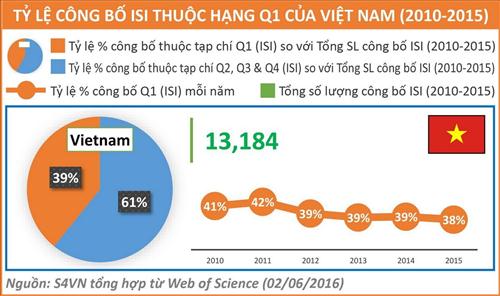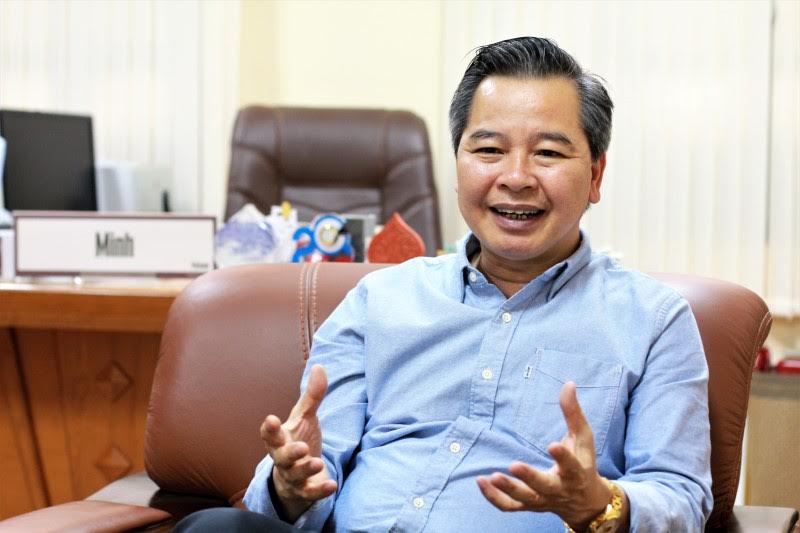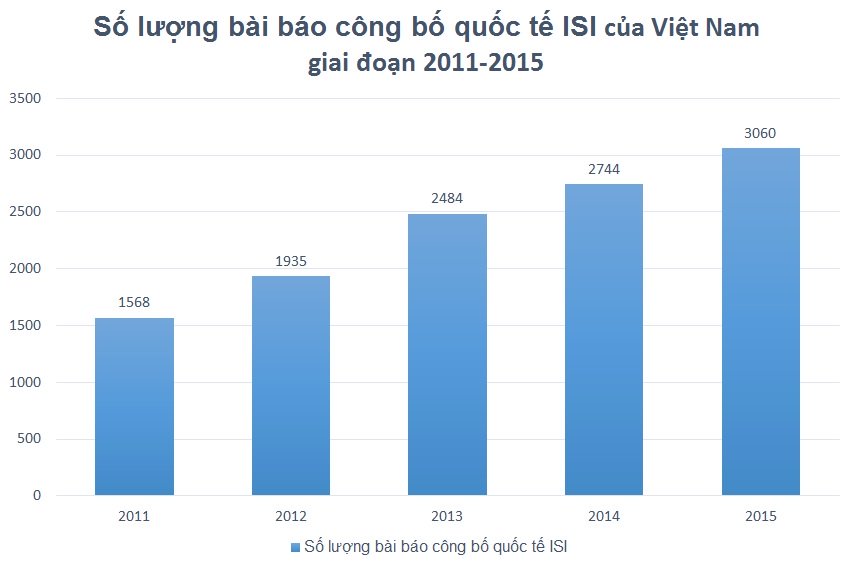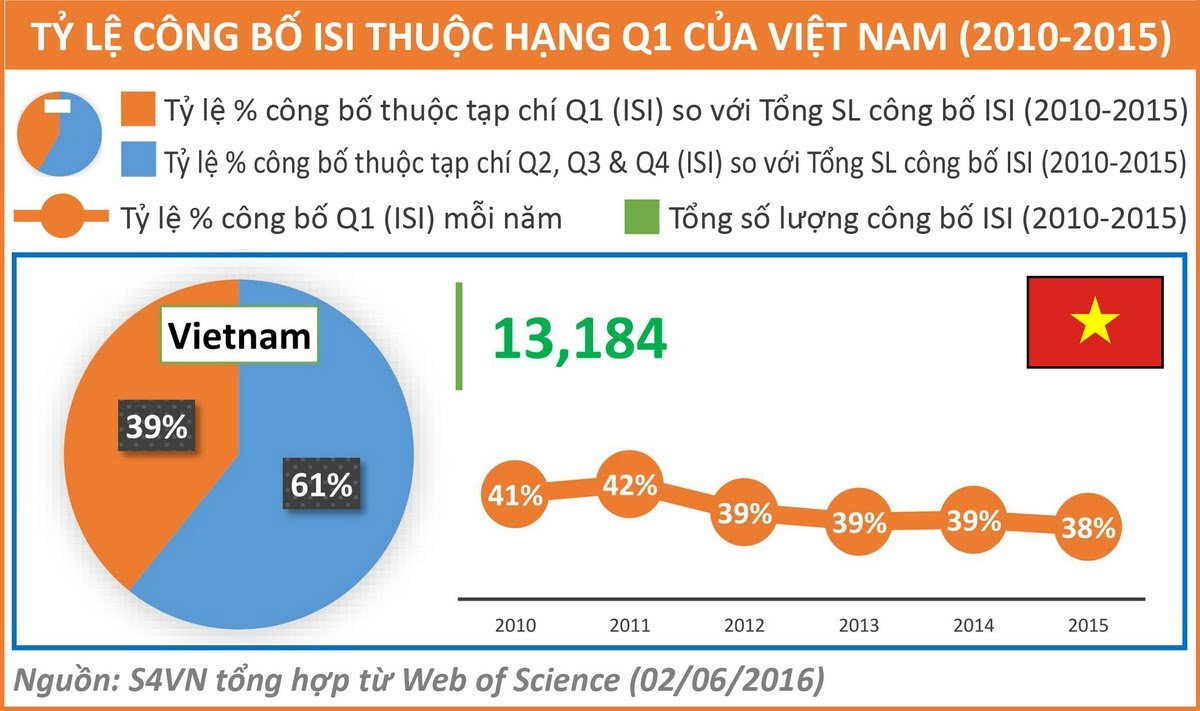
Editor's note: DraftThe regulations on standards for professors (GS) and associate professors (PGS) recently announced by the Ministry of Education and Training have caused much debate. The main topic of the debate revolves around the ISI and Scopus publication criteria for candidates as well as council members (industry and interdisciplinary).
While those in the natural sciences and engineering (NS&ET) sector believe that candidates and council members should have more ISI/Scopus publications, those in the social sciences and humanities (SH&H) sector believe that this sector has its own characteristics and limitations in international publications.
VietNamNet had a discussion about the issue of international publication in the fields of social sciences and humanities with Prof. Dr. Pham Quang Minh, Rector of the University of Social Sciences and Humanities (VNU Hanoi).

Prof. Dr. Pham Quang Minh
"Vietnam is like a new horizon, a fertile land for research"
Some say that social sciences and humanities have their own characteristics, so it is more difficult to publish internationally than natural sciences and engineering. As a professor of social sciences and humanities, what is your opinion on this issue?
- I think that international publication in the fields of social sciences and humanities is not as difficult or as difficult as people think. On the contrary, there are many advantages for researchers in the fields of social sciences and humanities to have international publications.
One is,The vivid reality in Vietnam, from political, economic, to socio-cultural, security, defense issues, etc., can all become extremely diverse and rich research subjects. Vietnam can be considered a "new horizon", "fertile land", a "living museum" for researchers to carry out their research ideas.
Therefore, many researchers in the field of social sciences and humanities around the world have paid attention to Vietnam. Case studies on Vietnam have contributed to clarifying many theoretical issues, or have become typical and characteristic studies.
Second,Since the country's renovation and the end of the Cold War, the trend of cooperation and exchange between Vietnam and other countries in the world has been growing very strongly, so more and more scientists have come to Vietnam to do research and many Vietnamese scientists have had the opportunity to exchange and discuss with foreign countries. Since then, the formation of ideas and common research topics has not encountered as many barriers as before and is increasing day by day.
Third,The fields of science and technology also have more and more young cadres who have been trained abroad. These people are gradually taking on important roles and with new research methods and new approaches trained abroad, the international publication of this generation of young scientists is also very favorable.
Final,Currently, social sciences and humanities as well as other fields are receiving great support from the State through mechanisms. For example, the NAFOSTED Fund is ready to support researchers when they have good ideas and international publications.
With the above advantages, I can affirm that international publication in the fields of social sciences and humanities is not difficult, nor is it something impossible.
Some people also say that the field of social sciences and humanities has its own political mission and tasks, so not all fields can be published internationally. What is your opinion?
- As a scientist, the main political task is to conduct truly quality research that serves the policies and guidelines of the Party and State. The political task is not to illustrate policies and guidelines.
If scientists have quality research, the world can understand and correctly understand our policies and guidelines, so they do not misunderstand. And if we want our research to be read and understood by the international community, of course that research must meet international scientific standards. We cannot have a research that is so isolated that no one can understand it.
Many people also think that the research subjects of the Social Sciences and Humanities are “sensitive.” In my opinion, this is an excuse, not looking directly at the problem. For prestigious scientific journals such asISI, ScopusScientific quality is the top requirement and has a decisive influence on whether an article is published or not.

Vietnam's ISI international publications exceeded 3,000 articles for the first time in 2015 according to data from Web of Science updated by S4VN on June 2, 2016.
I often tell the lecturers in the school, if you think your article is considered “sensitive”, then show it to me to see if it is “sensitive” or contains “state secrets”. So far no one has shown it.
One-dimensional thinking makes us lost
So, in your opinion, how should the "specialty" of the Vietnamese Social Sciences and Humanities sector in international publication be understood?
- It is true that the social sciences and humanities, especially the social sciences and humanities of Vietnam, have certain difficulties leading to limited international publication results at present.
Our first difficulty is language. Many researchers, especially those of the older generation, are not fluent in English, the current main academic language in international publication indexing systems such as ISI/Scopus. However, language difficulty is not the main difficulty.
The biggest difficulty for our researchers in the field of social sciences and humanities is the methodology and research methods. We have been isolated for a long time, only trained, exchanged and cooperated with scientists in the socialist bloc. Now the world political situation has changed, there is no longer the distinction and separation as before, the world has entered a period of integration, so the issue of science is no longer isolated.
One-way, passive, uncritical, rarely changing, often academic and scholastic thinking, lack of tools to refer to new research, lack of time and funding for field research have made our research projects dry, out of place, lacking novelty and science, and unconvincing.
According to you, what solutions are needed to enhance the international publication capacity for the social sciences and humanities?
-Firstly,There must be innovation efforts from scientists themselves. This is very important because no one can "hold hands and show them how to do it". Each scientist must regularly, persistently, continuously train and innovate, and be creative in order to make progress.
Next,It is necessary to increase exchanges, actively and proactively participate in international seminars and conferences, and propose cooperation with foreign scholars on common research topics.
Tuesday,Universities and research institutes need to have more active support to encourage scientists to publish internationally.
For example, in our school, any lecturer who has an international publication in the listISI, Scopuswill be rewarded 15 million VND immediately. The school is also willing to support the translation of lecturers' articles into English, support editing and introduce to reputable publishers. The school also supports each lecturer with 500 USD/year to participate in foreign conferences if their articles are accepted.

Total number of international publications of Vietnam (2010-2015) and the proportion of international publications in Q1 journals over the years. (Source: S4VN)
However, I also think that, in addition to scientific articles published in journals in the categoryISIandScopusCurrent criteria for international publications in the social sciences must also take into account book chapters and articles published by reputable publishers (for example,Routledge, Macmillian, Springer, Elsevier....) or articles in prestigious journals of prestigious universities in the top 100 universities in the world.
For example MagazineJournal of Vietnamese Studies (JVS)of the University of California, Berkeley, although not listed.ISI/ScopusSong is the most prestigious journal in Vietnam studies today. Anyone whose articles are published in this journal is known to the entire world of Vietnam studies.
Expanding the understanding of international publication in such a way is not limited to journals alone.ISI/Scopuswill ensure specificity for the social sciences and humanities.
For example, in the past 5 years, on average, staff of the University of Social Sciences and Humanities published about 50 international works per year. This number includes many genres from research articles in scientific journals, to book chapters, books, book introductions and in many languages, but mainly English. However, it is worth mentioning that out of these 50 works, only about 5-6 research articles (10%) were published in journals in the listISI, Scopus, are journals with scientific prestige and high impact factor.
Thank you for the conversation!
Le Vanperform
|
Some specific industries should be identified to encourage research that benefits Vietnam. I agree with the view of quantifying and raising standards for recognition as Professor and Associate Professor. Having work published in ISI/Scopus journals also has the advantage that this is a common database recognized by the academic community. However, in this system, the level of prestige/quality of each specific journal is also uneven. For the Social Sciences and Humanities Group, posting an article or publishing a monograph often takes a long time, in some cases years. Meanwhile, risks can occur when the social phenomenon/issue that is the subject of research is no longer suitable. For example, the withdrawal of the United States from the TPP Agreement will make it difficult for many studies related to this Agreement to be accepted for publication because the TPP issue is no longer "hot". On the other hand, there are specialized fields or research areas that are very effective for Vietnam, however, the number of journals in the ISI/Scopus system is not available or not many, so it is also very difficult to be published. In my opinion, we should identify some specific fields for the Social Sciences and Humanities Group (for example, Ethnology, Security - Defense, Physical Education - Sports...) to encourage research that is beneficial to Vietnam, which may not or has not been of international interest. For other fields in the Social Sciences and Humanities group, the minimum standard should be 3 articles for Professors and 1 article for Associate Professors in international scientific journals in the ISI/Scopus system. There should be regulations on the appointment term (for example 5 years), then review if anyone meets the qualifications to continue to hold the title of Professor or Associate Professor. In addition, most of the criteria for appointing Professors and Associate Professors have been quantified. Therefore, it is necessary to review the regulations on the authority and voting procedures of the Professor Title Council. At the same time, the Draft should specify that the members of the Council must meet the minimum standards of Professors (according to the new standards) to ensure fairness. In the long term, training institutions should be empowered to decide on criteria and appointments. The State Council for Professor Titles should build a database system similar to Vietnam's ISI/Scopus for training institutions to refer to. Dr. Pham Trong Nghia, Postdoctoral Fellow of the Global Leadership Research Program between Oxford University, UK and Princeton University, USA |
|
Scientific background of Professor Pham Quang Minh Main research and teaching directions: International relations in the Asia-Pacific region; Vietnam's foreign policy and international relations; Comparative political science and political institutions. He is the author of 6 books and textbooks for undergraduate and graduate training in Vietnamese, English and German, and 76 scientific articles published in domestic and foreign journals. He has 10 research programs and topics that have been and are being implemented, such as: Main solutions for foreign information of Hanoi city until 2020 (from 2014 - 2015); The process of forming a new security architecture of the Asia-Pacific region and its impact on Vietnam (2014 - 2016); In search of an ASEAN Identity (2010 - 2011); The process of forming Vietnam's innovative foreign policy from 1986 to present (2009 - 2011); The fluctuations of the East Asian geopolitical region in the first two decades of the 21st century (2008 - 2010); The EU through the Eyes of Asia (2007 - 2009); Reform trends in Siam and Vietnam in the late 19th - early 20th century: Causes of success and failure (2005 - 2006)... |
Author:Le Van - VietNamNet
Newer news
Older news